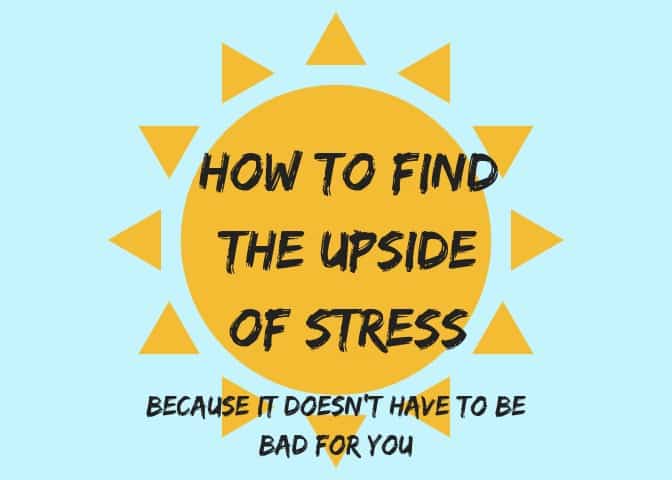
This post contains affiliate links.
We’ve all heard about the negative effects of stress. I mean, do you remember that commercial about cortisol? I can still hear it playing in my head:
“Stress increases cortisol. Cortisol increases belly fat. XYZ products helps reduce belly fat. You need XYZ product!” Funny how that sticks with you.
Cortisol is indeed a stress hormone, along with adrenaline and norepinephrine. And these hormones, in the short term can be helpful to us, but over extended periods of time they can cause our blood vessels to constrict and other major problems.
The Risks and Effects of Stress Can Be Pretty Rough
Long term, high stress has been linked to an increase in risk for heart attack, stroke, insulin resistance, diabetes, IBS, acid reflux, and can even make you more susceptible to an infection and cause your body to take longer to heal when you are sick.
That’s what we’ve all heard. And it’s true…
…but only if you believe it’s true.

I’ve Got the Research; No Quackery Here.
I promise, I am not some charlatan who’s going to tell you that living in a state of positive denial is how you get through life, so bare with me. I’m talking science here bro, I promise.
Researchers conducted a study about the effects of stress and found that high stress led to an increased risk of death… but only in the participants who believed that stress was harmful to them. Crazy right?!
The participants who believed that their stress was a challenge that they would overcome and wouldn’t hurt them…had the lowest risk of premature death.
Even lower than participants with less stress!
They Concluded That Stress Itself is Not Bad For Us
But that believing stress is bad…is what’s bad. Wow, that’s a tongue twister.
Apparently the negative effects of stress are almost like Tinkerbell–you have to believe in order for them to exist!
Those participants who didn’t have an increased risk of disease or death had a couple other characteristics that set them apart from the others in the study.
…Like their ability to see the positive intent behind the effects of stress
Rather than becoming anxious or upset that the effects of stress had caused their heart to race, they were able to recognize the positive intention.
For instance, they believed it was in order to prepare them to act.
Instead of worrying about the heavier breathing, they knew that their bodies were using the extra oxygen to better power their brain. The clearer thinking is useful in times of stress.
These mental shifts made a huge difference in the way their body reacted. Even though the physical effects of stress are uncomfortable, they can also be helpful.
Focusing on the benefits acts as a protection against the long term negative impact.
The Human Mind is Your Greatest Ally in Changing the Long Term Effects of Stress
The human mind is a powerhouse that can directly impact the entire body system and I don’t mean that in a “just be positive and think away all your problems” way.
You can’t think away all of your problems but the way you think can and does impact your problems.
Sometimes changing your mind actually does change your problems. You may still be stressed but changing your mind about stress can change how it impacts your body, apparently.
Good news, right?
Besides changing your mindset, there was another thing that set these people apart and, to me, this is where it gets really interesting…
The Positive Effect of Stress We Don’t Hear About
When we experience stress, there is another hormone that your body produces that mitigates the negative impact of the other stress hormones…if we use it.
During times of stress, the body releases Oxytocin which we sometimes refer to as the “hug hormone.” This little powerhouse encourages bonding and social connection.
It’s the chemical responsible for the bonding between mothers and babies after childbirth. It’s also the reason we want to reach out to a friend for support or comfort when we are struggling.
When we follow that desire and reach out for support, our brain releases more of the hug hormone.
The ‘Hug Hormone’ Changes the Long Term Negative Effects of Stress
Oxytocin has the power to mitigate the potentially negative impact of cortisol and norepinephrine (you remember, the ones that lead to all the crappy stuff and death).
Basically, it plays a big part in why these participants had the lowest risk of mortality despite higher stress levels.
Offering support to someone else who is struggling, ALSO releases Oxytocin! Volunteering, encouraging someone, or being the person who listens to someone struggling all help release the hug hormone.
Related: Exercise can help manage stress. Here’s how to get motivated.
Both Giving and Receiving Support Protects Against the Effects of Stress.
Because we as humans do best with balance, it’s often best to do both. Give and ask for support when you struggle, knowing that as you do, it will help protect you from cortisol.
It’s another good reason to ignore that little voice that tells you not to “burden” other people by asking for support. It helps you, and it helps them, too.
If you want more info, this research was turned into the book, The Upside of Stress.
It’s full of ways to protect yourself from the negative effects of stress and way more information about the research findings. It’s fascinating.
Mindful Self Compassion Can Help
This stuff is always easier on paper, especially if you still (even with my awesome reframe) have trouble asking for support.
I’ve been working through this book on mindful self compassion that I wholeheartedly recommend: The Mindful Self Compassion Workbook. It rocks!
Practicing self compassion has helped me change my thought life in big way. A regular practice can help you embrace the new ways of thinking about the effects of stress and learn to reach out. Among other things!
You can also learn more about Self Compassion in general, here.
Connect With Me
What do you say, have I thoroughly blown your mind yet? Drop me a comment and let me know
Leave a Reply